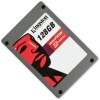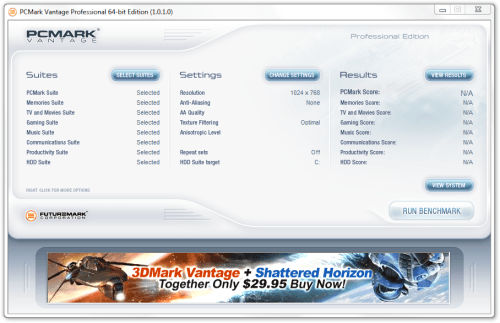- Qualcomm Launches Snapdragon 4 Gen 2 Mobile Platform
- AMD Launches Ryzen PRO 7000 Series Mobile & Desktop Platform
- Intel Launches Sleek Single-Slot Arc Pro A60 Workstation Graphics Card
- NVIDIA Announces Latest Ada Lovelace Additions: GeForce RTX 4060 Ti & RTX 4060
- Maxon Redshift With AMD Radeon GPU Rendering Support Now Available
Kingston SSDNow V+ Series 128GB

A couple of weeks ago, Kingston announced a revision to its V+ series of SSDNow drives. In addition to a brand-new controller from Toshiba being utilized, along with Toshiba NAND, the new V+ drives support TRIM right out of the box. This, along with good pricing and excellent performance, make the latest V+ drives well-worth looking out for.
Page 3 – Synthetic: PCMark Vantage
There are few PC enthusiasts who are unfamiliar with the name “Futuremark”, as the Finland-based developer has been producing quality benchmarks to help us gauge our computer’s worth for years. Originally known as Madonion, Futuremark has expanded its focus to go beyond its bread and butter, graphics and gaming, and tackle other areas, such as full system performance. That’s where PCMark comes into play.
The company’s most recent addition to the PCMark family is Vantage. For most users, a full suite would be run, but because we’re focused on storage performance only, we instead run only the storage-specific tests. Fortunately, Futuremark makes this easy for us to do as it has split up the entire suite into seven separate sub-tests, one being the aptly named “HDD Suite”.
PCMark’s HDD Suite may look simple on the surface, but it’s actually quite exhaustive. While the benchmark does deliver a simple “overall” result, it actually tests I/O performance based on a variety of scenarios, from adding music to Windows Media Player, to loading applications in succession, to editing video, to running a malware scanner, and more. It even includes metrics to evaluate a simulated Windows Vista boot time, so Futuremark has done a fine job of combining many useful scenarios into a single button press.










The first generation X25 takes the overall Vantage score, but the 128GB Kingston is not far behind. What IS far behind is the hard disk drive when we focus on the HDD subtest score. With scores that are almost six times higher than a typical SATA 3Gbit/s desktop hard drive, almost any SSD begins to look appealing here in comparison to the beleaguered hard drive.
As we noted previously, the X25 results are a bit on the low side here, most likely due to the extensive dirty condition of the drive was in. Despite the same conditioning, the Summit does well here with it’s strong sequential write speeds, and unfortunately, the Toshiba controller is able to offer even higher sequential write speeds above the rest of the drives in this review, helping it to place well in many tests.
Support our efforts! With ad revenue at an all-time low for written websites, we're relying more than ever on reader support to help us continue putting so much effort into this type of content. You can support us by becoming a Patron, or by using our Amazon shopping affiliate links listed through our articles. Thanks for your support!





